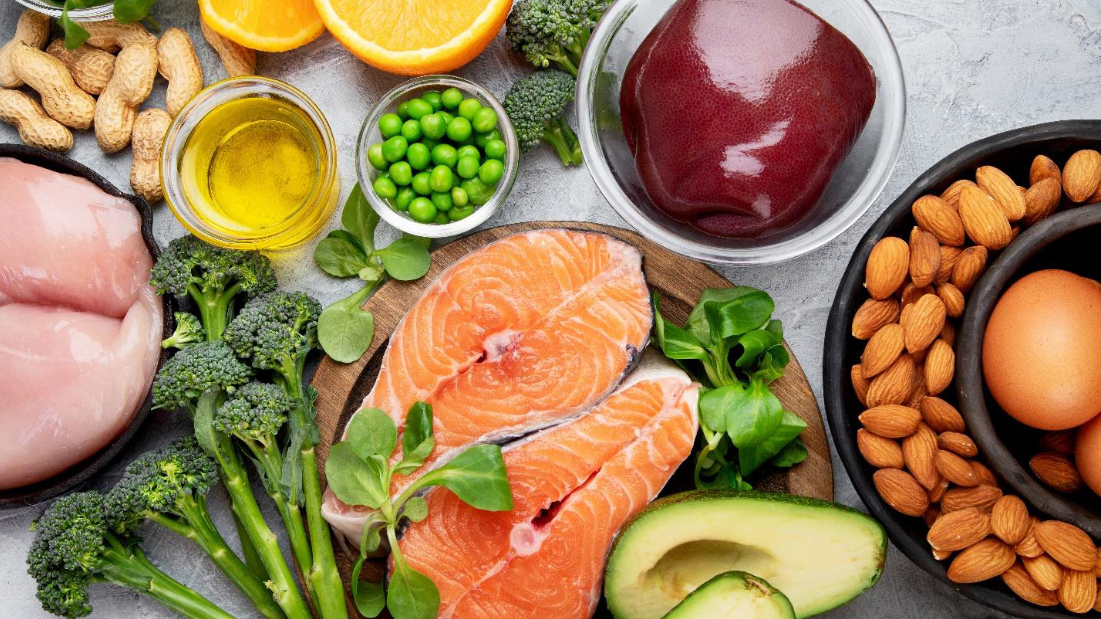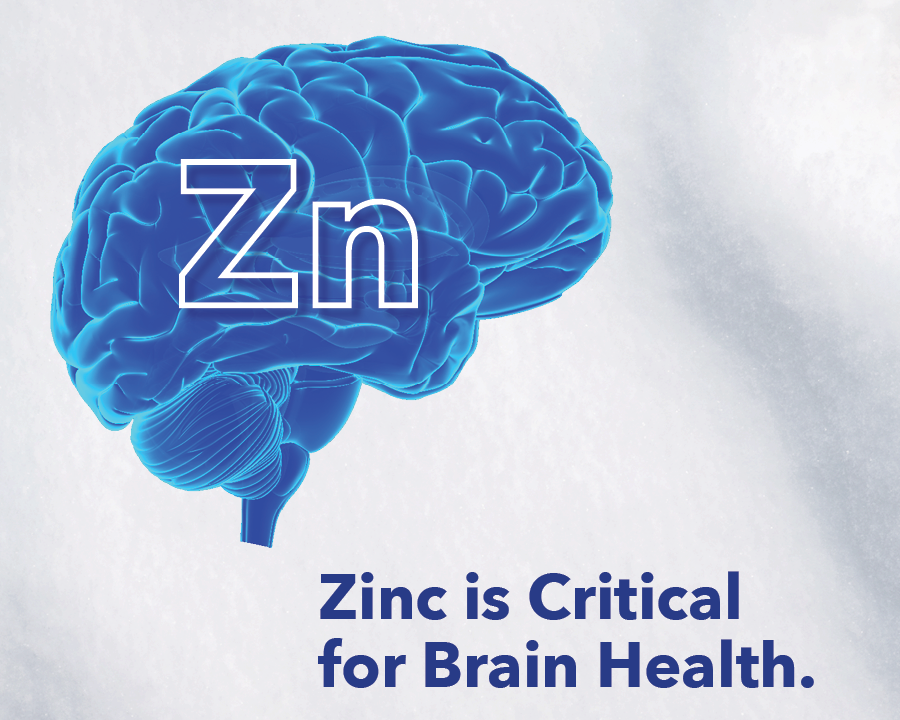People take supplements to improve or optimize their health. So what happens when you look at the label, and the ingredient list is filled with unrecognizable additives?
As a vital trace mineral, zinc is required for numerous functions throughout the body. And while its immune-supporting benefits are often highlighted, zinc is also critical for brain health. In fact, the mineral has been found to be important for supporting normal brain and nervous system function, including memory, concentration, attention, and healthy mood.

For mental health, some of the latest research suggests that zinc supplementation can have a positive effect on normalizing mood. Additionally, higher intake of zinc from the diet has also been shown to be supportive, both as a protective measure and for individuals looking to support their emotional health.1
Similar results have also found improved cognitive function, typically involving focus, concentration and attention with zinc supplementation.2 These cognitive supporting benefits are likely stronger for individuals that are deficient in the mineral.
In addition, zinc plays a role in normal food intake and digestion. Zinc deficiency alone can cause or contribute to a loss of appetite, digestive upset, reduced food intake and increased mood symptoms. For individuals with digestive symptoms, it may be worth evaluating zinc status.3

As a supplement, zinc likely has beneficial effects on the brain through several mechanisms. The neurotransmitters serotonin and dopamine both require zinc for their production.4 Serotonin is typically considered the “feel good” neurotransmitter in the brain. In addition, zinc plays a role in the development of new brain cells while also reducing brain cell death. Zinc is crucial for protein function throughout the body and brain and also has anti-inflammatory properties.
Unfortunately, often due to poor dietary choices, low zinc intake is common, especially for individuals on vegan or vegetarian diets. The most absorbable forms of zinc are found in animal products, including lamb, beef and poultry. While there is zinc in whole grains, beans, nuts and seeds, plant sources of the mineral are typically high in phytates, compounds that bind to zinc and make it harder to absorb.5 Some of the richest sources of zinc include oysters, lamb, beef, pumpkin seeds, almonds, chickpeas and lentils.
And while supplementing zinc may help to support normal brain health and function, it is possible to get too much. Long-term supplementation of zinc over 40 mg a day from both diet and supplements can eventually cause problems. If taken at these higher doses, zinc starts to deplete copper. Taken for long enough, a person can develop a copper deficiency which can cause anemia and nerve damage.6
Zinc is a crucial—and often overlooked—mineral. For any individual wanting to support normal cognitive function and emotional health, evaluating zinc status is warranted. In cases where individuals have an outright deficiency, supplementation may help to provide support.

Ask The Expert
Can zinc improve my mood?
Dr Greenblatt- Zinc supports normal brain and nervous system function. For individuals low in zinc, the mineral can still help to support and normalize cognitive function and emotional health.
Should I have my zinc levels tested to check to see if I am deficient?
Dr Greenblatt- Maybe. Unfortunately, blood testing for zinc is not overly accurate in identifying deficiencies. While blood levels showing a deficiency are cause for concern, normal zinc blood levels do not rule out problems. For most individuals, adding supplemental zinc at a reasonable level is safe and can help support any potential deficiency. Before starting any supplements, however, always check with your doctor.
I heard zinc is good for immune function, is that true?
Dr Greenblatt- Yes! Zinc plays an important role in supporting the body’s defense system, promoting healthy neutrophil, natural killer cell and T-lymphocyte function.
I am a vegetarian. Can I get enough zinc from my diet?
Dr Greenblatt- Vegans and vegetarians are at a greater risk for developing a zinc deficiency. However, by focusing on eating enough zinc-rich foods, it is possible for most healthy vegans or vegetarians to meet their minimum zinc requirements.
My child is struggling with a poor appetite and reduced food intake. Should I give them a zinc supplement?
Dr Greenblatt- Maybe. The symptoms described could be due to a zinc deficiency but could also be due to numerous other causes and should be evaluated as such. As always, talk with your pediatrician before starting any nutritional supplementation program.
Taking zinc makes me nauseated. Are there options for supplementation that don’t cause nausea?
Dr Greenblatt- Taking zinc on an empty stomach can cause nausea. Taking zinc at the end of a meal or taking the forms that are better absorbed, like zinc picolinate, zinc citrate or zinc monomethionine may also help reduce nausea symptoms.
I found a zinc supplement at the drugstore that has 50 mg of zinc per tablet. Is that too much?
Dr Greenblatt- It depends. For short periods of time, taking a supplement that is over 40 mg of zinc is likely safe. Studies have used doses of 75 mg per day for short periods of time. However, taking 50 mg continuously for longer periods of time can eventually cause a copper deficiency leading to anemia and nerve damage and should be avoided.
Yosaee S, Clark CCT, Keshtkaran Z, Ashourpour M, Keshani P, Soltani S. Gen Hosp Psychiatry. 2022;74:110-117. doi:10.1016/j.genhosppsych.2020.08.0
Talebi S, Miraghajani M, Ghavami A, Mohammadi H. Crit Rev Food Sci Nutr. 2022;62(32):9093-9102. doi:10.1080/10408398.2021.1940833
Su JC, Birmingham CL.. Eat Weight Disord. 2002;7(1):20-22. doi:10.1007/BF03354425
Petrilli MA, Kranz TM, Kleinhaus K, Joe P, Getz M, Johnson P, Chao MV and Malaspina D (2017) Front. Pharmacol. 8:414. doi: 10.3389/fphar.2017.00414
Maares M, Haase H. A Guide to Human Zinc Absorption: General Overview and Recent Advances of In Vitro Intestinal Models. Nutrients. 2020 Mar 13;12(3):762. doi: 10.3390/nu12030762. PMID: 32183116; PMCID: PMC7146416.
Plum LM, Rink L, Haase H. The essential toxin: impact of zinc on human health. Int J Environ Res Public Health. 2010 Apr;7(4):1342-65. doi: 10.3390/ijerph7041342. Epub 2010 Mar PMID: 20617034; PMCID: PMC2872358.
Share:
Related Posts

Benefits of Creatine in Perimenopause and Menopause
Written by Maura MacDonald, MS, RD, CSSD | 2025 As we age, the notion is that we will inevitably become weaker. Not as mobile as

Goodbye Pie Chart, Hello Phase 1 Sliders
Written by Allison Smith, ND | 2025 As we usher in a new era of DUTCH testing which leaves behind the concept of the three-way

Introducing the DUTCH Dozen
Written by Kelly Ruef, ND | 2025 Hormone testing can be complex, which is why Precision Analytical developed the DUTCH Dozen, an interpretive framework that

DUTCH Report Enhancements
Written by Hilary Miller, ND | 2025 Precision Analytical have released the newest version of the DUTCH Test. This is the report’s most significant update

Gallbladder Health 101: What It Does and How to Keep It Working Well
Written by Ashley Palmer & Pooja Mahtani | 2025 The gallbladder may not get much attention compared to the gut, but it plays a central

